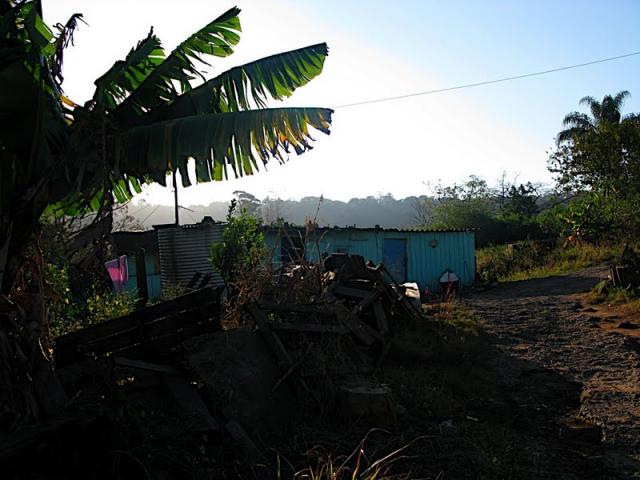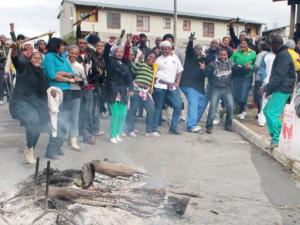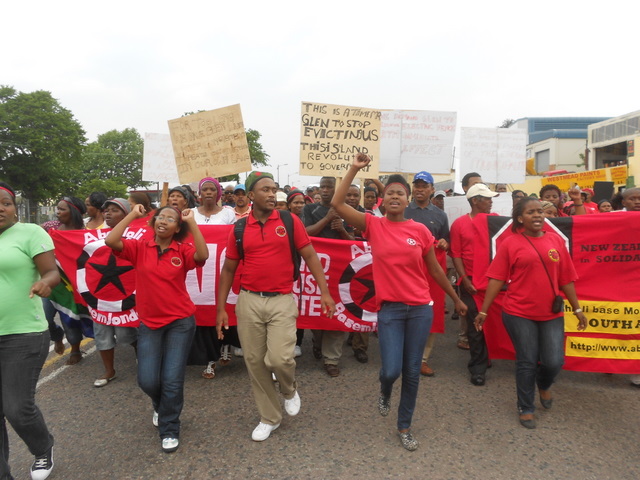
Lot 35 Motala Heights
Eviction of 23 Families in Motala Heights; Intimidation by Landlord and the Pinetown Legal Aid Board
This week 23 families living in tin-shanty houses in Motala Heights, Lot 35, were issued with letters, demanding that they pay exorbitant increases in rent – effective immediately – or face eviction. A pensioner, seeking advice about the letters, was told by the Pinetown Legal Aid Board that he would be “in the firing line” if he challenged the so-called landlord. Yesterday, relatives of the so-called landlord threatened an area coordinator for Abahlali baseMjondolo for assisting the families, warning that they would “come to your home and deal with you.”
Abahlali has been fighting against violence, intimidation and evictions by Motala landlords for years. Many of these battles have been won against the notorious gangster landlord Ricky Govender (who has also threatened the press). Now, Abahlali will struggle again, this time against a different landlord, so that families can live in safety, free from the fear of homelessness and retribution by the landlord of Lot 35.
Eviction of 23 Families
Rent for the tin-shanty houses has been doubled or tripled, according to the letters issued by a lawyer acting for the person who is suddenly claiming to be the landlord of lot 35.
One family, both pensioners, had been living in their house for the last 35 years and had been paying R200 per month. Now, the letter instructs them to pay R700 per month. This violates the Rental Housing Act that regulates rental increases. It is a clear attempt to force the families off the land.
But the so-called landlord’s claim to ownership of Lot 35 is uncertain. On four plots of land, 12 families have been paying in person to different rent collectors for many years. Some have been paying this way for decades. Now, the letters instruct the families to deposit money into the bank account of someone claiming to be the new landlord of Lot 35. Tenants have had no prior notice of any sales or transfers of land ownership. The plots were reportedly sold years ago through various verbal contracts agreement and family arrangements, not by title deed. The recent letters from the lawyer did not advise residents to meet or discuss the matter with the person suddenly claiming to be the landlord of lot 35. They offer no proof that this person is now the legal owner of the land.
There have been a number of incidents in recent years where Ricky Govender has suddenly claimed to be the owner of land on which people are living, or of common land in Motala Heights, while the dead office does not show that he is the owner of this land. He has even built houses for rent on the land that he does not appear to own.
There have been similar instances where other people have suddenly arrived, claimed ownership of land and sought evictions or a re-direction of rent payments without being able to prove their ownership of the land. People in Motala Heights have good reason to be suspicious of people who suddenly and without proof claim to be owners of the land on which they have been living for decades.
In total, 23 families on Lot 35 have been instructed to pay the increased rent this month, August, or be evicted. The letters state that the families are in arrears. But all the families say their rent is paid in full and up to date. In fact some had already paid their rent for this month before they received the letter notifying them of the increase. Those who have paid their rent for this month did so to the rent collector that they have always ordinarily paid. But the letters state if they do not pay the full amount to this new landlord, they will be evicted. Tenants on the Lot have consistently paid their rent over the years, but have never been told, until now, that they owe money to this new landlord.
One tin-shanty house on Lot 35 was burnt to the ground last month, while the family was attending a funeral out of town. To this day, they do not know how their home – along with all their personal belongings, such as clothes, furniture and ID books – was set ablaze. All they have left is what they brought with them to the funeral. A church donated materials so that the family could rebuild, from which they have constructed a new home. Now, the person claiming to be the new landlord is demanding that they break down this home, or he will call the municipality to do so. The family, with a one-month old baby and two other children, has no other shelter.
Legal Aid Board Intimidation
When one pensioner went to the Pinetown Legal Aid Board for advice, a representative told him that he “already knows all about Lot 35 and what is happening there.” He was told he would be “in the firing line” if he contested the rental increase and the eviction threat from the landlord and warned not to challenge the landlord.
This is the second instance, at Lot 35, in which the Pinetown Legal Aid Board acted against its national and constitutional mandate to provide legal representation to the poor. In an ongoing eviction case at Lot 35, involving three of the families living there, the Pinetown Legal Aid Board stated in a letter that they were representing the landlord in court.
In the course of representing the landlord, the Pinetown Legal Aid Board sent letters to the families, which read: “NOTICE OF EVICTION”: “Kindly take note that you that you are hereby requested to vacate our clients’ premises with immediate effect.” The letters only were delivered recently, but are dated September 2007. Another letter is dated May 2006. When the families went to the Legal Aid Board in Pinetown for an explanation, they were turned away.
The residents then approached the Legal Resources Centre (LRC), which declined to take their case, but agreed to send a letter to Legal Aid inquiring why the Board, to assist those without the funds for private attorneys, was acting for a landowner with 15 houses. Thus far, Legal Aid has not responded to the LRC letter.
At the time the families under threat of eviction raised additional questions about the legal standing of the eviction notices, which must be delivered by the sheriff. These notices came by post. No PIE (Prevention of Illegal Evictions Act) notice was been issued as is required by the law. The Legal Aid Board was, therefore, not just representing the rich against the poor but was also complicit with straightforwardly unlawful and criminal behaviour.
On many occasions the Pinetown Police (SAPS) have also acted as if their job is to support the rich in Motala Heights in their often illegal attempts to exploit and evict the poor. They have even continued in this behaviour after being interdicted against unlawful behaviour.
If the Legal Aid Board and the Police act in complete contempt of the law and in blatant support of the rich what are the poor supposed to do?
Threats by the Family of the So-Called Landlord
While assisting the 26 families facing rental increases and eviction at Lot 35, an area coordinator for Abahlali baseMjondolo was threatened by relatives of the landlord in the presence of other representatives of the movement. The landlords’ relatives warned that they would “come to your home and deal with you.”
This is not the first time that Abahlali members and coordinators have been threatened by landlords in Motala Heights. Ricky Govender told the same area coordinator that he would have her killed for R50. He later came to her home, with his relatives, and assaulted her, which left her traumatized and in hospital.
Tenants in Lot 35 would like point out that they maintain their tin-shanty houses themselves. They do so with great care and pride, but say it is a battle to fix windows, leaking roofs, and dilapidated structures at their own cost, especially for pensioners, those with low income, or are unemployed. There is only one water tap for the whole Lot that is shared by 26 families. There is not even a postbox. Tenants, some who have been living there for close to 40 years, are scared and have nowhere else to go.
For further information and comment please contact:
Shamita Naidoo 074 315 7962
Bongo Dlamini 084 722 2637
Press Releases from Motala Heights
*Corruption and Armed Intimidation as Motala Heights Eviction Crisis Deepens, 20 June 2006.
*Motala Heights Eviction Crisis Continues, 30 June 2006.
*Motala Heights Eviction Crisis, Press Release 4, 21 August 2006.
*Shacks Demolished at Motala Heights, Pinetown, 29 October 2006
*Major Crisis as eThekwini Municipality Violently and Illegally Evicts Shackdwellers in the Motala Heights Settlement, 5 November 2006
*Victory for the people of Motala Heights, 13 December 2006
*Gangster Landlord Assaults Woman Activist and Threatens Twenty Families with Eviction, 8 August, 2007
*Four shacks Burn Down in Motala Heights, 10 September 2007
*Motala Heights Crisis Deepens as Violent Intimidation Against the Strong Poor Continues, 13 May 2008
*Court Action Against Intimidation in Motala Heights, 12 & 13 June 2008
*AbM Youth League Chairperson’s shack has just been lost to fire, 30 July 2008
*Armed De-Electrification in Motala Heights, 19 August 2008
*Six Families Under Threat of Eviction in Motala Heights, 20 April 2008
*Police Support for Landlord Intimidation Continues in Motala Heights, 30 April 2009
Pictures from Motala Heights
*Ricky Govender gets his demolitions at Motala Heights (3 years ahead of the City’s schedule), 31 October, 2006
*At the High Court for the Motala Evictions Case, 22 November 2006
*Motala Heights on 12 December 2006 – the day before an eviction
*SAPS stop Municipality workers from demolishing shacks, 13 December 2006
* Photo essay on Motala Heights in December 2006 by Antonios Vradis.
*Shack cinema, Motala Heights 11 March 2007
*iPolitiki ePhilayo: Motala Heights Development Committee AGM, emZabalazweni, Motala Heights Settlement, 20 May 2007
*Motala Heights, 2 August 2007. The day after Govender promised to bulldoze Uncle Jame’s house by the end of the month
*Motala Heights, Meeting Against Evictions 4 August 2007
*“Motala Heights Indian Shacks” – pictures by Shamita Naidoo, taken first week of August, 2006
* The morning after 4 tin shacks burnt in Motala Heights, 9 September 2007
*‘Meeting of the Poor Against the Rich’, 17 November 2007
*The Motala Diggers, 31 October, 2008
*New Evictions Threatened in Motala, 20 April 2009
*Launch of the new Creche in Motala Heights, 26 April 2009
Newspaper articles on Motala Heights
*Isolezwe, 30 October 2006 Bathi abayi ezindlini abakhelwe zona
*Mercury, 30 October 2006: Council vows to get rid of shack dwellers
*Mercury, 30 November 2006: Shack dwellers win court order against municipality
*Highway Mail, 17 August 2007: We Won’t Go
*Mercury, 4 September 2007: Photographer was threatened, Police rescue news team after fracas
*Highway News, 11 September 2007: News team threatened for shack story
*Highway Mail, 14 September 2007: Homes in Ashes
*Mail & Guardian, 21 September 2007: ‘They can pack up and go’
*Highway Mail, 24 September 2007: No assistance for Motala Heights fire victims
*Mercury, 8 October 2007: Court halts landlord’s threats
*Daily News, 16 June 2008: Order won to prevent harassment: Tenants take landlord to court
*Mercury, 17 June 2008: Order granted against landlord ‘harassment’
*Mercury, 21 August 2008: Land owner to take legal action to evict tenants
Other Media
*CNN, 11 June 2008: Slums offer surprising hope for tomorrow’s urban world
Legal Documents on Motala Heights
*Affidavit on the Founding of Motala Heights by Bheki Ngcobo
*PDF copy of letter from the Legal Resources Centre to City Manager Sutcliffe, 23 November 2006
*PDF copy of court order preventing further demolitions in Motala Heights (29 November 2006), Letter from the Legal Resources Centre to the Pinetown SAPS (11 December 2006) and a letter from the LRC to the city’s lawyers (12 December 2006)
*Interdict preventing Ricky Govender from bulldozing the home of Mr. and Mrs. Pillay and from threatening or assaulting them, 28 September, 2007
*Court papers for interdicts against Ricky Govender et al, the Station Commander of the Pinetown SAPS & the Minister of Safety & Security, 13 June, 2008
*Letter from CALS to Ricky Govender’s lawyer on ongoing intimidation of James Pillay despite the interdict, 8 July 2008, 2008
*Letter from CALS to Ricky Govender’s lawyer explaining that they have no legal basis to evict, 31 July 2008, 2008
Other Documents
*Facing Uncertainty with Unity: Lives and livelihoods of shack dwellers in Motala Farm by Lisa Fry, late 2006
*Comments by people who resisted evictions in Motala Heights in December 2006, document drawn up in early 2007
*Report on Public Participation Exercises For: “The Elimination and Prevention of Re-emergence of Slums Bill” (See section 3 for an account of the two visits of Tim Jeebodh to Motala Heights.
*Freedom of Expression Institute statement that makes reference to Govender’s death threats to journalists
*Abahlali baseMjondolo & the Police A list of key incidents of police harassment between March 2005 and January 2008 (including references to incidents in Motala Heights)
*Letter to the eThekwini Municipality from groundWork on illegal dumping by Ricky Govender, January 2008
*COHRE report on housing rights in Durban (includes Motala Heights), October 2008
And a poem…
*For Motala Heights, a poem by Jacques Depelchin, April 2009
And two short documentary films…
*Motala Farm, May 2009
*Still UnFree, June 2009
Various documents on New eMmaus
New eMmaus is just over the hill from Motala Heights and is not under the control of Govender. However the two areas share, in part, a common history as people who were evicted from land owned by the Catholic Church live in both New eMmaus and Motala Heights. (Their ancestors came to the Marianhill Monastery as converts – they were evicted when the monastery sold land off for factories to be developed).
*New eMmaus Cracks, Press Release, 3 October 2006.
*New eMmaus Cracks – photographs, 3 October 2006.
*Emmaus residents fall into housing cracks, Sunday Tribune article, 22 October 2006.
*Abahlali to Mourn UnFreedom Day 2007 & Celebrate the Strength of the Strong Poor in New eMmaus, 27 April, 2007.
*Pictures of the UnFreedom Day Celebration in New eMmaus, 27 April, 2007.



